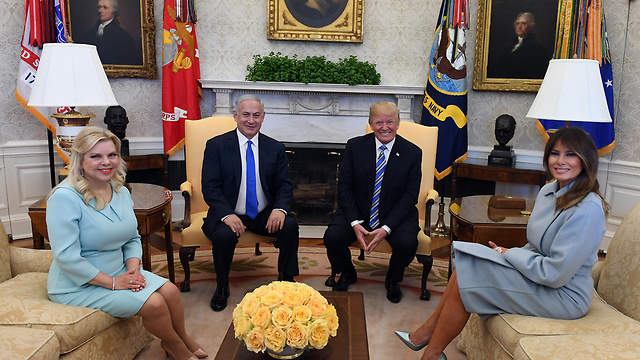It’s been three years, and it seems Netanyahu’s appetite for power knows no limits. He was forced to give up the ministry he held most dear—communications—and the one that’s likely to cost him the most, politically speaking. He also had to give up the finance and industry ministries. But that’s peanuts in comparison to the two highly prized portfolios he now holds—foreign and defense. Not to mention the Health Ministry, which he nominally holds thanks to the odd arrangement with Deputy Health Minister Yaakov Litzman of United Torah Judaism. And then there’s the Immigrant Absorption Ministry, a by-product of Yisrael Beytenu’s departure from the coalition.
And of course, the role as prime minister is not really a ministry, but it is the heaviest of loads.
Of all of the above, it’s clear which ministry is Netanyahu’s favorite. All prime ministers, and particularly those who hold the defense ministry, love the photo-ops that hanging around soldiers gives them in times of political and legal uncertainty. Netanyahu is now seizing this opportunity, like a devoted cosplayer posing with his idols at ComicCon.

Once the rage over the handling of the Gaza crisis abated and the stories from the northern front took over, with the operation to uncover Hezbollah tunnels, Netanyahu didn’t miss an opportunity to be seen close up with the boys in green. He posed as he listened to them, emoting tension and worry.
This isn’t a healthy situation, however, and it highlights a problematic theme in Netanyahu’s fourth term: the notion that he and the state are one, a single entity whose elements we should not even dare consider in isolation from one another, lest a terrible fate befall us.
Netanyahu and his supporters firmly believe that he is the finger in the dam (après moi, le déluge!), and that’s absurd. The prime minister’s position guarantees enough influence as it is. But apparently when you’re convinced you’re a giant among dwarfs, this just isn’t enough.
That’s why when Netanyahu hints at relinquishing some of his power, it seems the decision is more political than professional. Last week, Israeli media reported on the speculation surrounding a possible new foreign minister. According to the report, Netanyahu’s aim is not to raise up potential rivals for his own job, like former minister Gideon Sa'ar, but rather to go for less threatening individuals—loyal lieutenants such Energy Minister Yuval Steinitz or Transportation Minister Yisrael Katz.
There’s no consideration of who would be the best person to stabilize the Foreign Ministry in a time of turmoil. Only a few days ago, officials at that very ministry criticized Netanyahu for the grim state of affairs among the staff. But what does an ambassador's distress matter when one must belittle one's possible heirs?
Perhaps the solution is right under our noses. Perhaps we need a woman at the helm of our diplomatic corps. No, not Tzipi Hotovely, who has been deputy foreign minister for three years - someone more experienced in hob-nobbing with presidents and kings.
For now she is in Guatemala, on her maiden diplomatic trip. But when she returns, and this coup can be checked off the list, the matter will surely be settled. The prime minister’s wife will be appointed as the next foreign minister; for when you need to keep the important ministries in Netanyahu hands, any Netanyahu will do.


















